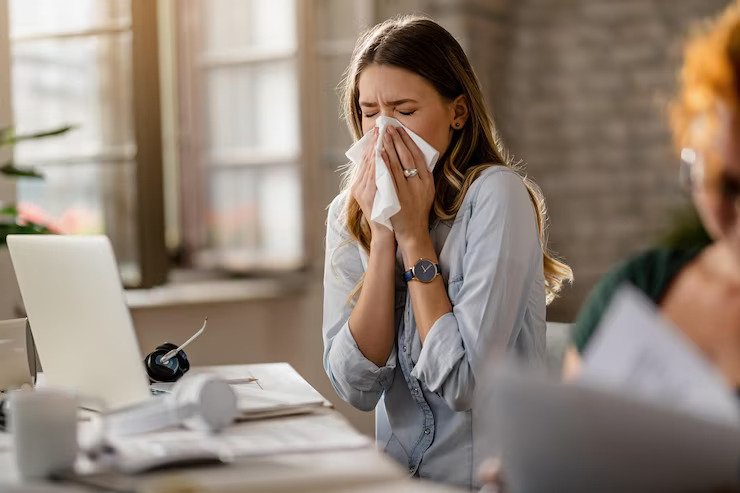Preventive Healthcare
Sneezing - Effects, Causes, Complications and Treatment
11629 Views
0

You first notice annoying symptoms like a runny nose and sneezing when you have a cold. Sneezing is one of the ways your body tries to get rid of the viruses that make you sick. It happens when the viruses irritate the lining of your nose and throat and cause a reflex reaction. Sneezing is a very effective way of getting rid of viruses, but it can also be a nuisance. If you have a cold, there are some things you can do to try to stop sneezing.
What is a Sneeze?
Sneezing is expelling air from the nose and mouth to remove irritants, foreign particles, or pathogens from the respiratory tract. Sneezing is a reflexive action that is involuntary and cannot be stopped once it starts. An irritant usually precedes it in the nose, such as dust, pollen, or a foreign body. It is a general symptom of allergies and colds.
Runny Nose and Sneezing: A runny nose and sneezing are common symptoms of a cold or allergies. They happen when viruses or allergens irritate the lining of your nose and throat. A runny nose is when your nose makes more mucus than usual. Sneezing happens when your nose and throat muscles contract to eliminate the irritants. A runny nose can be generated by allergies, colds, or other conditions.
What Happens If You Sneeze?
Sneezing is a reflexive action that is involuntary and cannot be stopped once it starts. An irritant usually precedes it in the nose, such as dust, pollen, or a foreign body. Sneezing is a very common symptom of allergies and colds. When you sneeze, your nose and throat muscles contract to eliminate the irritants. This causes a burst of air to be expelled from your nose and mouth. Sneezing can be contagious, so it is essential to protect your nose and mouth when you sneeze to control the spreading of viruses or allergens to others.
What Causes Sneezing?
Many different things can cause sneezing, including:
- Allergies: Sneezing is a common symptom of allergies, such as hay fever.
- Colds and flu: These respiratory illnesses are caused by viruses that irritate the nose and throat.
- Dust: Dust particles can irritate the nose and throat, causing a person to sneeze.
- Perfumes and Other Strong Smells: Some people are sensitive to certain smells and will sneeze when they encounter them.
- Weather changes: Changes in temperature or humidity can trigger sneezing.
What are The Complications of Sneezing?
Most of the time, sneezing is a harmless reflexive action. However, some rare complications can occur. These include:
- Broken Blood Vessels: Sneezing can sometimes cause broken blood vessels in the face.
- Ear Injuries: Sneezing can also cause ear injuries, such as ruptured eardrums.
- Sinus Infection: If the mucus from a sneeze drains into the sinuses, it can cause a sinus infection.
- Pneumonia: Sneezing can also cause pneumonia, which is a serious lung infection.
When Should You See a Doctor?
You should see a medical practitioner if you are sneezing more than usual or if you have symptoms such as a sore throat, a runny nose, or a fever. These could be the major signs of a more serious condition, such as a cold or allergies. A doctor can help you identify the cause of your sneezing and recommend treatment options.
Sneezing Treatment
There is no specific treatment for sneezing. However, there are some things that one can do to help relieve your symptoms. These include:
- Drink Plenty of Fluids: This will help thin the mucus in your nose strings and make it easier to blow your nose to eliminate the irritants.
- Use a Humidifier: This will add moisture to the air and help keep your nose from drying. A humidifier can also help reduce the irritants in the air.
- Use Saline Nose Spray: This can help moisturise your nose and reduce irritants. Nose spray can also help clear out your sinuses to breathe better.
- Take Over-The-Counter (OTC) Allergy or Cold Medication: These can help relieve some of the symptoms of sneezing, such as a runny nose and congestion.
- Avoid Irritants: If you know what is causing your sneezing, try to avoid it. For example, if you have allergies, avoid things that trigger your allergies, such as pollen or pet dander.
- Keep Your Hands Clean: Viruses that cause colds and flu can spread through contact. So, washing your hands often or using hand sanitiser is important.
- Cover Your Nose and Mouth When You Sneeze: This will help prevent the spread of viruses.
Can It be Prevented?
There is no sure way to prevent sneezing. However, there are some essential things that one can do to reduce your chances of getting a cold or allergies, such as:
- Wash your hands often.
- Avoiding close contact with people who are sick.
- Avoiding things that trigger your allergies, such as pollen or pet dander.
- Getting a flu shot every year.
- Wearing a face mask if you have a cold. etc
Conclusion
Sneezing is a very common symptom of allergies and colds. It is an involuntary reflexive action that cannot be stopped once it starts. Sneezing is usually preceded by an irritant, such as dust, pollen, or a foreign body in the nose. Most of the time, sneezing is a harmless reflexive action. However, some rare complications can occur. These include broken blood vessels, ear injuries, sinus infections, and pneumonia. A doctor can help you identify the cause of your sneezing and recommend treatment options. This article has looked at sneezing, its causes, complications, and when to see a doctor. Sneezing is a reflexive action that is involuntary and usually caused by an irritant, such as dust, pollen, or a foreign body in the nose. Most of the time, sneezing is a harmless reflexive action. However, some rare complications can occur.













1701259759.webp)









 WhatsApp
WhatsApp